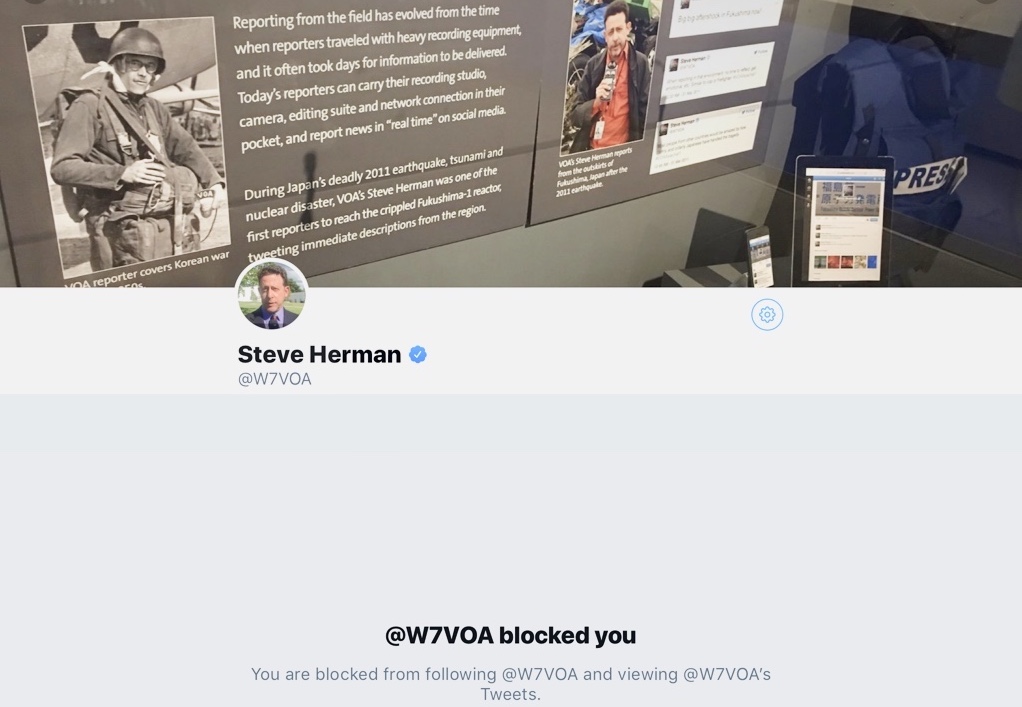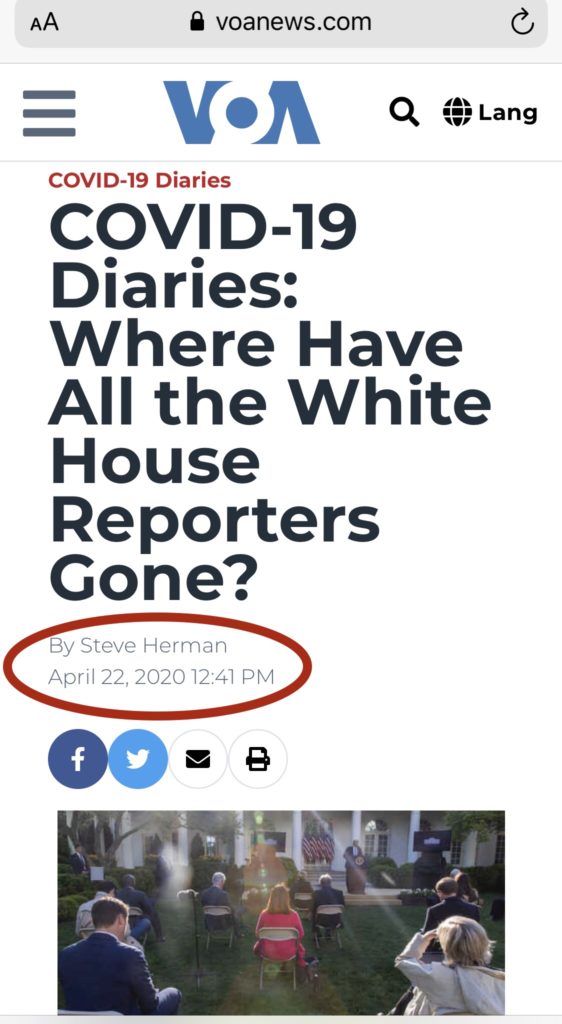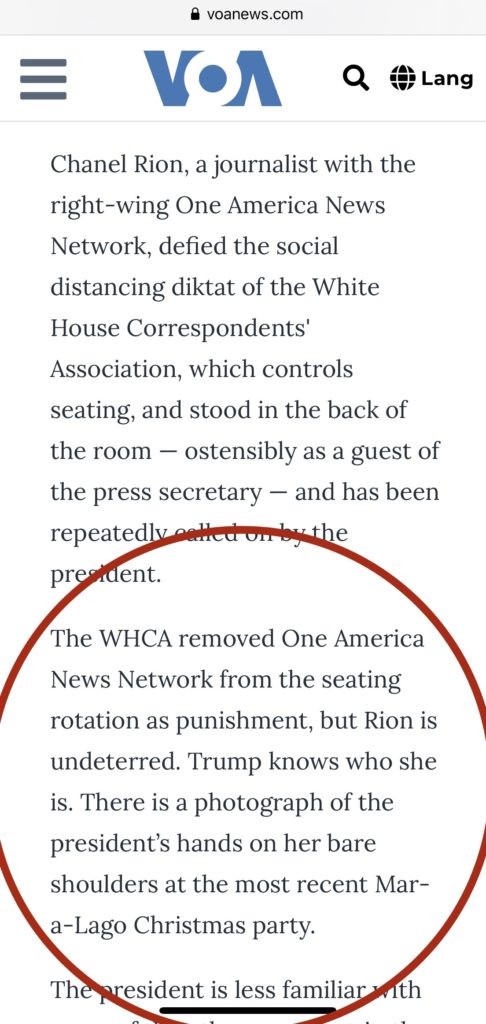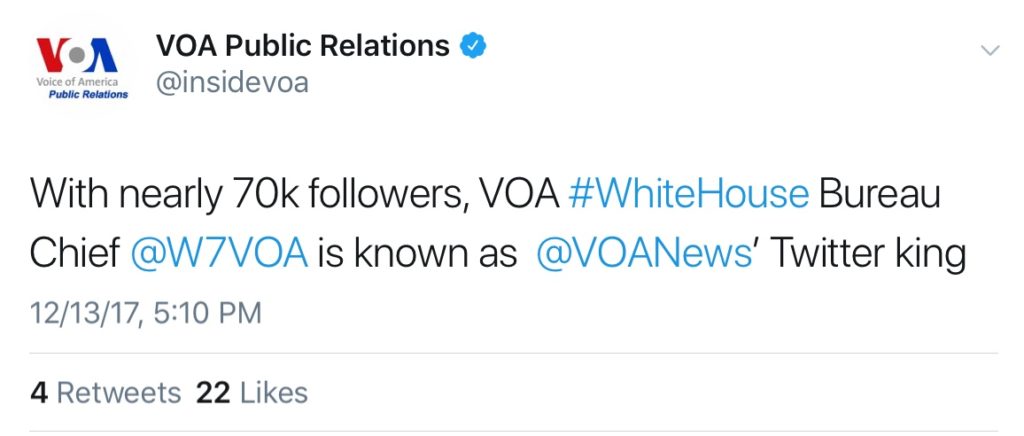USAGM WATCH COMMENTARY
Voice of America (VOA) White House Bureau Chief Steve Herman, who was accused by Vice President Mike Pence’s staff of tweeting and disclosing off the record information with regard to the controversy over the Vice President not wearing a face mask during a visit to the Mayo Clinic earlier this week, in 2017 had banned our watchdog website and some of our volunteer reporters who are former VOA journalists from following his VOA work-related Twitter account. Steve Herman imposed his ban on our website and reporters who followed his Twitter account after BBG – USAGM Watch criticized him for tweeting unconfirmed news claims, some of which turned out to be false. BBG – USAGM Watch urged him to obey the two-source rule and to follow the VOA Charter which says that VOA News must be accurate, balanced and comprehensive. Herman was forced to lift the ban after BBG – USAGM Watch complained to the U.S. Agency for Global Media (USAGM), which oversees VOA, that such an action initiated by a U.S. federal government employee amounted to interference with a free media.
The VOA Public Relation Office responded to BBG – USAGM Watch complaint in an e-mail on December 27, 2017:
VOICE OF AMERICA PUBLIC RELATIONS: VOA was not aware that anyone had been blocked from any personal social media accounts. After you brought the issue to VOA management’s attention, it was discussed with the reporter who has since lifted the blocks from his account.
In response to the controversy over the dispute with Vice President Pence’s office, the Voice of America management said in a statement to The Hill that “VOA adheres to the highest journalist standards.” He has received in the past high praise from VOA Director Amanda Bennett on a number of occasions.
During his April 15, 2020 White House press briefing, President Donald Trump said that what is coming out of the U.S. tax-funded, U.S. government-managed Voice of America is “disgusting” and “a disgrace.” He called on Democrats in the U.S. Senate to quickly confirm his nominee Michael Pack to be CEO of the U.S. Agency for Global Media (USAGM) which oversees the Voice of America. VOA Director Amanda Bennett, who was appointed in 2016 during the Obama administration, rejected criticism of her leadership and management. She disagreed with the White House statement accusing the Voice of America of promoting propaganda and disinformation from the Chinese communist government in Beijing.
In 2017, on his Twitter account bearing the “VOA” letters, @W7VOA, Steve Herman gave his professional endorsement for an erroneous report about Russia influence investigation by ABC reporter Brian Ross. The report, retweeted by Herman, caused the stock market to drop significantly before recovering after the news was declared to be false. In his tweet, Herman called Brian Ross “arguably the most connected broadcast reporter for some decades when it comes to learning about details of federal criminal investigations.” The next day, the ABC network issued an apology: “We deeply regret and apologize for the serious error we made yesterday.” The ABC network also announced in a statement that “Effective immediately, Brian Ross will be suspended for four weeks without pay.” Steven Herman continued to receive praise from VOA Director Amanda Bennett and the rest of VOA’s top management.
Not strange to controversies, in a recent VOA feature news report “COVID-19 Diaries: Where Have All the White House Reporters Gone?,” Steve Herman appeared to be going after White House reporter Chanel Rion. Herman wrote that President Trump calls on her frequently and knows who she is because, as he put it, “there is a photograph of the president’s hands on her bare shoulders.” He also wrote in his VOA report that Trump is less familiar with some of the other reporters who, as Herman put it, are “usually those who are African American or Asian.” Chanel Rion’s mother is Korean.
STEVE HERMAN: Chanel Rion, a journalist with the right-wing One America News Network, defied the social distancing diktat of the White House Correspondents’ Association, which controls seating, and stood in the back of the room — ostensibly as a guest of the press secretary — and has been repeatedly called on by the president.
STEVE HERMAN: The WHCA removed One America News Network from the seating rotation as punishment, but Rion is undeterred. Trump knows who she is. There is a photograph of the president’s hands on her bare shoulders at the most recent Mar-a-Lago Christmas party. The president is less familiar with some of the other reporters in the room. “Who are you with?” he sometimes asks reporters, usually those who are African American or Asian.
Here are excerpts showing how USAGM – BBG Watch commented in July 2019 on the Twitter ban incident which took place sometime in late 2017. BBG – USAGM Watch pointed out that Steve Herman behaved as President Trump did when he banned certain individuals from following his Twitter account and was forced later by a U.S. court ruling to stop such bans. But while both Trump and Herman work for U.S. taxpayers, Trump is also an elected politician while Herman is only a civil service journalist whose salary is paid all Americans and who is working as a U.S. government employee for an agency which exists to support free press.
Secret Facebook Pages and Twitter Blockers at USAGM
July 21, 2019
By BBG – USAGM Watch Contributor
Senior VOA Reporter Was Forced to Reverse Twitter Block of Watchdog Site; Agency Operated or Sanctioned Secret Facebook Groups for Years
LIKE TRUMP, ONE SENIOR VOA CORRESPONDENT BLOCKED PRIVATE WATCHDOG MONITORING OF TWITTER FEED
The story that deserves recalling now involves the person holding perhaps the highest-profile job there is in the VOA news bureau network in Washington — that of White House correspondent.
In 2017, the BBG-USAGM Watch Twitter account and the personal Twitter account of one of BBG-USAGM Watch supporters were blocked by VOA chief White House correspondent Steve Herman from seeing his Twitter account.
At about the same time when the VOA Public Relations office called Herman “Twitter King,” he blocked the BBG-USAGM Watch website from following his Twitter feed.
In an inquiry to agency officials, BBG-USAGM Watch asked if management had ordered Herman to block Twitter accounts of this U.S. citizen/taxpayer-run website.
BBG-USAGM Watch noted that many of the tweets on Herman’s channel were posted by him in his official capacity as an employee of the United States Government, some during official working hours at U.S taxpayers’ expense.
Were Herman’s tweets in the public domain? Were they subject to federal record-keeping requirements? Could a BBG/VOA employee decide on his or her own whether tweets should not be seen by certain citizens? Did blocking a watchdog website advance the agency’s stated mission of supporting freedom of the press and democracy?
Clearly, Herman’s Twitter block against an American watchdog site had the effect of making domestic U.S. media journalistic investigation of a federal government agency more difficult.
Among other things, Herman had re-tweeted some tweets from other news outlets that later turned out to include inaccurate information. BBG-USAGM Watch asked whether the VOA two-source rule should also apply to tweets by its correspondents.
AGENCY FORCES REPORTER TO REMOVE BLOCK
In its response, USAGM (known then as the Broadcasting Board of Governors before the agency rebranded in 2018) said it had “determined” that Herman’s Twitter channel “was a personal account rather than an official VOA account.”
“Personal accounts and the content they contain are not directly subject to agency oversight or control since they are not government property,” an agency spokesperson said.
“Nevertheless, employees are expected to manage any personal account associated with official agency business in a professional manner consistent with general standards and practices applicable to journalists and federal employees, including VOA’s best practices guide.”
So, the agency did not outright say that it was not OK for one of its highest profile reporters to block a fellow citizen’s observation of his government work output. USAGM offered an excuse that he was doing so using a personal account.
Keep in mind, Herman never created any new separate official account to reflect nothing but his reporting for a federal agency.
Nevertheless, the agency decided it was wise to have a talk with Herman, adding that the agency’s management had not been aware “that anyone had been blocked from any personal social media accounts.”
“It was discussed with the reporter who has since lifted the blocks from his account,” said the USAGM spokesperson.
DAMAGE ALREADY DONE
But the damage had been done. An agency with a record of, putting it mildly, not doing enough to create and enforce specific guidelines regarding social media was apparently clueless that its highest profile correspondent had attempted to block an independent outside U.S. watchdog website.
The agency decided to have that conversation with the correspondent only after he was caught — because it looked bad to have one of its most visible reporters trying to exclude someone in digital space.
Here’s what Knight Institute director Jameel Jaffer said in response to the recent court ruling involving President Trump:
“The ruling will ensure that people aren’t excluded from these forums simply because of their viewpoints and that public officials don’t transform these digital spaces into echo chambers,” adding this will “help ensure the integrity and vitality of digital spaces that are increasingly important to our democracy.”
BBG-USAGM Watch reporting over the past decade uncovered numerous examples of BBG/USAGM, VOA and other agency employees violating the kind of reporting and social media guidelines that were already in force at non-government media organizations the agency likes to associate itself with.
These included use of social media channels and regular reports for advocacy and self-promotion, biased reporting, and posts of obscene material. Senior VOA managers at one point failed to uncover a fake social media account claiming to represent the head of VOA’s Persian Service and gave it legitimacy by following the alleged fake account for several years.
All of this, as well as other examples, forced VOA director Amanda Bennett to issue statements warning against biased reporting, and order agency employees to undergo bias training.
Today, the Voice of America’s Best Practices Guide cautions against “[taking] a controversial position or [making] a controversial comment online [that] can reflect poorly on you and on the agency” including “not only includes individual posts or tweets, but also posting your political affiliation or causes in your social media profile. . .in particular, retweeting or “liking” an opinion on one side of the issue or another could be seen as an endorsement from you or from VOA.”
There is this additional piece to the story involving Herman.
On July 11th, after former White House adviser Sebastian Gorka clashed in the Rose Garden with CNN contributor Brian Karen, Gorka was confronted by none other than Herman.
“If you believe in not blocking anybody, that anybody should have a fair chance, you blocked me, you blocked hundreds and hundreds of. . . .” the video (posted by Herman himself) shows him asking Gorka.
After Gorka acknowledged that he blocks whoever he wants “because they’re ass-hats” Herman asked if he should be considered an ass-hat.
After the @POTUS statement, I queried @SebGorka (former deputy assistant to @POTUS) in the @WhiteHouse Rose Garden about why he blocks so many journalists (including me) on Twitter, despite insisting that people on social media shouldn’t be blocked. Here’s what happened. pic.twitter.com/ujpztNDncb
— Steve Herman (@W7VOA) July 11, 2019
We will only note that it takes a degree of chutzpah for the same VOA reporter who himself had carried out a Twitter block — before being taken to the woodshed by his managers — to challenge someone else on this issue.
Earlier Herman even took time to explain the subtle difference between blocking and suspending someone’s Twitter account.
Fact check: @RealJamesWoods has not been “banned” by #Twitter. But his account has been suspended at least twice for what the social media platform deemed was abusive behavior. https://t.co/WcLTGpaH02
— Steve Herman (@W7VOA) May 4, 2019
Of course, it’s likely that few followers of Herman on Twitter were aware of his attempt to block an independent watchdog site.
I feel this is important history for our readers to know.
Read About Secret Facebook Pages of VOA Director in Part II
The author of this guest commentary, who is both as a reporter and a commentator, does not wish to be identified out of concern for protecting news sources. The author is solely responsible for all personal opinions and reporting for this article.




